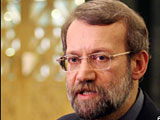|
|
TODAY.AZ / Politics
Tehran expects talks with EU to resume
20 February 2007 [09:25] - TODAY.AZ

Iran's top nuclear negotiator Ali Larijani and the EU's Javier Solana met on the sidelines of the 43rd Munich security conference earlier in the month and agreed to resume talks, which were initiated to persuade the Islamic Republic to abandon its uranium enrichment program but which broke down in October, where they had been left off.
"We believe the parties' positions could be clarified during the talks to ensure Iran's legitimate right to peaceful nuclear technologies, on the one hand, and to sweep aside the other party's concerns [over Iran's possible deviation form the peaceful line], on the other hand," Manuchehr Mottaki said.
Iran's resumption of uranium enrichment in January 2006 has given rise to international suspicions that the country could be pursuing a nuclear weapons program, although Iran has consistently denied this.
The standoff caused by Iran's unwillingness to suspend nuclear research culminated in the United Nations Security Council adopting a resolution in December that imposed sanctions against Iran banning activities involving uranium enrichment, chemical reprocessing, heavy water-based projects, and the production of nuclear weapons delivery systems.
On February 23, the International Atomic Energy Agency, the UN nuclear watchdog, is to deliver a report on the country's compliance with the sanctions.
Iranian Foreign Ministry spokesman Mohammad Ali Hosseini vehemently ruled out a halt to uranium enrichment last week, but said that Tehran was ready to consider fresh proposals on its nuclear program if the talks resumed. RIA Novosti
URL: http://www.today.az/news/politics/36730.html
 Print version
Print version
Connect with us. Get latest news and updates.
See Also
- 07 May 2025 [11:40]
Azerbaijani and Iraqi Foreign Ministers hold tête-à-tête meeting in Baghdad - 07 May 2025 [11:31]
Left with nothing - mourning in Armenian organizations of the USA - 07 May 2025 [11:11]
Armenia loves with ears: Armenian dreams of corridors - 07 May 2025 [11:02]
Azerbaijan expresses concern over escalating tensions between India and Pakistan - 07 May 2025 [09:30]
Azerbaijan’s top diplomat begins official visit to Iraq - 06 May 2025 [22:59]
Prime Minister of Belarus concludes official visit to Azerbaijan - 06 May 2025 [21:54]
President: Azerbaijan and Vietnam have every opportunity to further develop cooperation potential - 06 May 2025 [15:10]
Victims testify in trial of Ruben Vardanyan on charges of war crimes and terrorism - 06 May 2025 [13:31]
Water Blackmail: A dirty game from Armenia to India - 06 May 2025 [12:43]
Belarusian PM visits Victory Park
Most Popular
 Public hearings resume in high-profile trial of Armenian citizens accused of war crimes
Public hearings resume in high-profile trial of Armenian citizens accused of war crimes
 Water Blackmail: A dirty game from Armenia to India
Water Blackmail: A dirty game from Armenia to India
 Armenian Church went all-in
Armenian Church went all-in
 Friend or foe? Russia undermines its own alliances in post-Soviet space
Friend or foe? Russia undermines its own alliances in post-Soviet space
 Pakistan tests new ballistic missile after India violates Water treaty
Pakistan tests new ballistic missile after India violates Water treaty
 Belarusian PM Turchin to visit Azerbaijan
Belarusian PM Turchin to visit Azerbaijan
 Belarus donates special-purpose vehicle to support Aghdam's municipal services
Belarus donates special-purpose vehicle to support Aghdam's municipal services
